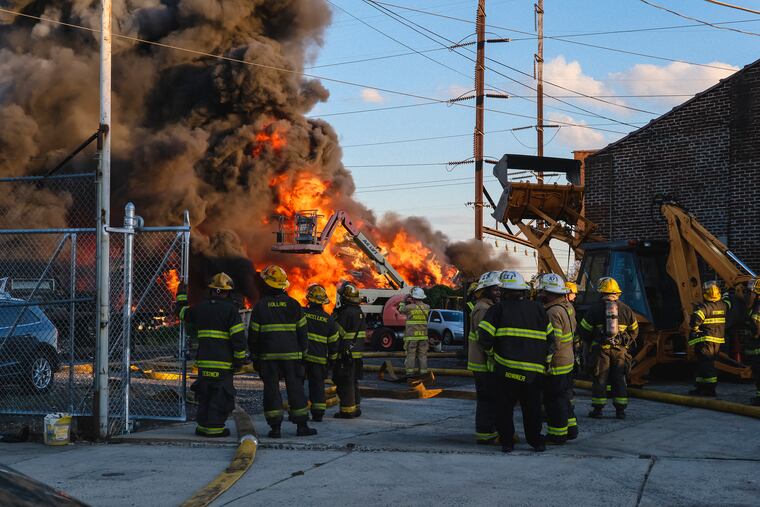Major pollutant spiked to unhealthy level during junkyard fire
The fire at Titan Auto Recycling caused an air pollutant to spike to a high of 74.5 micrograms per cubic meter. The EPA standard is an average of 35 micrograms over 24 hours.

The major air pollutant known as fine particulate matter spiked well above healthy levels in a North Philadelphia neighborhood Tuesday evening during a massive junkyard fire but returned to normal within a few hours, according to the city’s Department of Public Health.
Officials said Wednesday that residents can return to their normal routines without fear of inhaling excessive amounts of PM2.5, an air pollutant that is smaller than the width of a human hair and easily inhaled. Officials had warned residents to remain indoors during the fire.
» READ MORE: North Philadelphia junkyard fire knocks out rail service and spurs air-quality alert
Health effects caused by excessive PM2.5 stem from short or long exposure and can range from aggravation of asthma and other respiratory illnesses to premature death in people with chronic heart or lung diseases. Children and seniors are most vulnerable.
The fire at Titan Auto Recycling, which is on West Sedgley Avenue and West Venango Street, caused PM2.5 to spike to a high of 74.5 micrograms per cubic meter at 7 p.m. Tuesday, according to James Garrow, a city health department spokesman.
The U.S. Environmental Protection Agency says anything above an average of 35 micrograms over a 24-hour period is unhealthy.
The data recorded by a city air monitoring gauge at 1501 E. Lycoming St., about two miles east of the fire, recorded a spike that lasted three hours — from 6 to 9 p.m.
As of Wednesday afternoon, the level of PM2.5 had dropped to 3.52.
“No other criteria pollutants were found to be elevated and PM 2.5 has stayed at normal since the 9 p.m. reading,” the health department said in a statement. “Additionally, no toxic compounds were identified at the site of the fire at levels that would pose a threat to human health.”
The blaze that ignited several cars at the junkyard caused other major temporary disruptions to SEPTA’s Regional Rail and Amtrak service